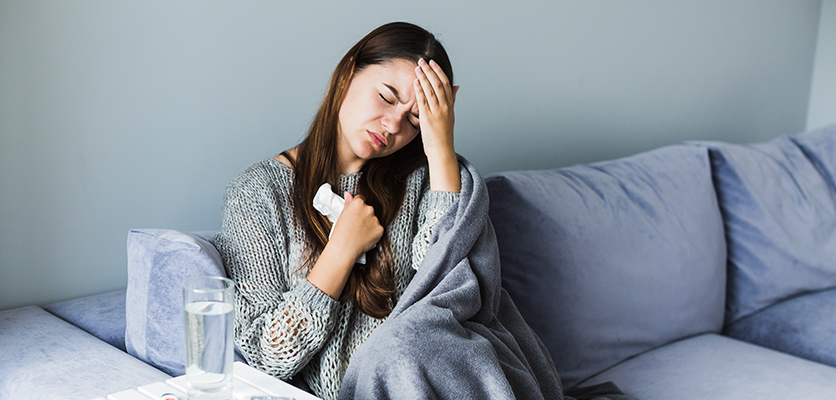Flu Prevention Can Help Save Lives. Here's Why It Should Be Part Of Your New Normal
Influenza may be common, but that doesn’t mean it’s not dangerous.
If there's one thing the COVID-19 situation has taught us, it's that prevention is better than cure
Preventive measures such as physical distancing, washing our hands, and wearing face masks are now part of our everyday routines, and will be the new normal for the foreseeable future.
It's so important to stay healthy in these times. Above all, our top priority right now should be our health, as well as the health of our loved ones.
While it's important to continue to curb the spread of COVID-19, we also shouldn't forget about the seriousness of influenza
It's vital to remember that influenza and COVID-19 are not the same thing.
However, safeguarding ourselves, our family, and the Malaysian community as a whole against vaccine-preventable diseases like influenza, otherwise known as flu, is essential.
And it all starts with taking flu prevention seriously, which includes getting the flu vaccine.
Influenza may be common, but that doesn’t mean it’s not dangerous. For people in high-risk groups, flu can even have life-threatening complications.
This includes children below the age of five, the elderly aged above 65, and the elderly with pre-existing conditions (i.e. heart disease/failure, respiratory disease, diabetes, etc.)
Did you know that the World Health Organisation (WHO) estimates that flu kills 290,000 to 650,000 people each year?
That's why it's so important to get the flu vaccine.
It is scary to think that, in Malaysia, we can catch the flu at any time throughout the year.
It's also really easy to catch influenza. Anyone can become infected by breathing in tiny airborne droplets containing the flu virus, or by touching the live virus (which can remain infectious for several hours on surfaces) and then touching your mouth, nose, or eyes.
Influenza can also affect you suddenly. You may feel completely fine one day, and start feeling sick the next. You may only start showing symptoms a few days after you're exposed to the virus. It's even possible for you to infect someone else with the virus before you yourself get sick.
First, it’s important to understand the difference between a cold and flu
We tend to say things like "I have the flu" when we get sick, but what we actually have is probably just the common cold, not flu. It's easy to mix up the two, as their symptoms are pretty similar.
However, there is a slight difference. If you have milder symptoms like a runny or stuffy nose, that's probably a cold. Flu is usually accompanied by other symptoms such as high fever, sore throat, muscle aches, and long-lasting headaches.
Plus, the main difference between them is that flu has more serious consequences. As flu is caused by a virus that attacks the respiratory system (nose, throat, and lungs), it can lead to serious complications like pneumonia and even death in high-risk groups.
You may have realised that the symptoms of flu also sound similar to COVID-19 symptoms, but it's important to note that these are two completely different diseases
That's why the anti-COVID-19 measures being implemented everywhere right now may not necessarily prevent you from catching flu, nor will getting the flu vaccine keep you safe from COVID-19.
But what the flu vaccination can do, is help protect you from influenza, which is why you should make it part of your new normal.
So, what is the flu vaccine?
The vaccine contains an inactivated or attenuated (weakened) flu virus. This small dose will stimulate your immune system to produce antibodies against the real thing.
According to the Centers for Disease Control and Prevention (CDC), getting the vaccine can prevent millions of influenza illnesses, tens of thousands of hospitalisations, and thousands of deaths.
As the flu vaccine is updated yearly to account for virus mutations, it's important that you get it annually, as this is the best way to help protect against flu. While the vaccine isn't 100% effective (its effectiveness can vary), it does greatly reduce the risk of getting influenza, by between 40% - 60%.
Getting vaccinated can also reduce the risk of transmitting the virus to someone else. So, if your whole family gets vaccinated, you will all be less likely to develop this life-threatening disease.
It’s not uncommon to hear of someone who claims to have gotten flu because of the flu shot. However, this is not the case.
Getting the flu vaccine will not cause you to get influenza. You may experience some side effects, but these are generally mild and will go away on their own within a few days.
Here are the actual side effects to getting the flu vaccine:
1. Irritation, redness, or swelling at the injection site
2. Mild headache, fever, nausea
3. Muscle aches
These symptoms tend to disappear after a few days, and only affect a small percentage of people. In very rare cases, people may have allergic reactions to the flu vaccine, but rest assured that doctors are well equipped to handle such cases.
The doctor administering the vaccine will normally ask you to wait in the clinic for half an hour before letting you go, in case severe, immediate reactions occur.
To encourage Malaysians to protect themselves and their families from flu, Immunise4Life has launched the 'Making Flu Prevention My New Normal’ National Pledge Campaign
By taking the pledge, you're making a promise to make flu prevention, which involves getting the flu vaccine, part of your new normal.
Besides the pledge, there are also lots of handy resources on the website, so that you can learn more about influenza and why prevention is so important. You can even look for your nearest vaccination clinic and send a caring e-card to your loved ones.
Together, we can keep Malaysia healthy and safe. Take the pledge now.



